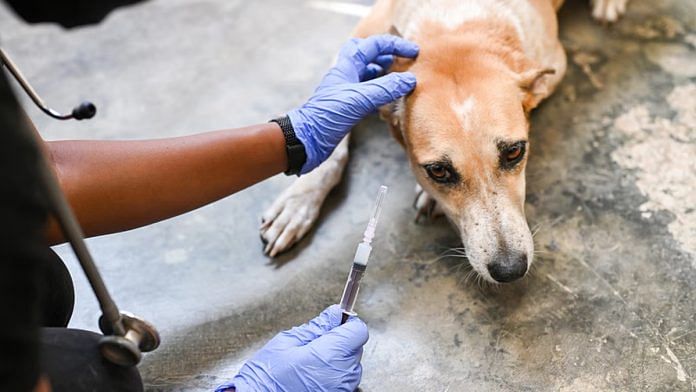Agra: Faced with a high number of dog bite cases and an increasing population of stray dogs, the Agra administration is implementing an ambitious plan — to make the city rabies-free.
A deadly viral disease, rabies spreads to humans and other animals through the saliva of infected animals, but is preventable through vaccination. So far, only Goa capital Panaji is reported to be rabies-free.
According to Uttar Pradesh government and district hospital records, Agra has over 90,000 stray dogs and around 60,000 pet dogs, and sees around 300 cases of dog bite every day. In comparison, the Delhi Municipal Corporation recorded only 1,100 dog bite cases between 1 April and 31 September, 2022. The all-India daily average of dog bites is 5,739, according to government data.
To tackle this situation, the Agra Municipal Corporation has plans to initiate a dog vaccination drive under which every stray and pet dog will be administered the anti-rabies vaccine this year, with a target of jabbing 250 to 300 dogs per day, Dr Ajay Kumar Singh, animal welfare officer (AWO) at the corporation, told ThePrint.
Asked when the project would take off, the AWO said as soon as possible, maybe even end of this month.
Singh said stray dogs have been on the radar of the corporation for quite some time and a limited-scale drive for sterilisation of male dogs has already been running in the city since April 2023, under which around 21,000 dogs have been sterilised.
But, he explained, the number of stray dogs is quite large and the municipal corporation can’t sterilise and vaccinate all of them using its limited resources. “So, a private agency is being sought which will not only sterilise but also vaccinate every dog on the streets of Agra. Vaccines will be provided by the animal welfare department,” Singh said.
Speaking to ThePrint, senior physician Dr S.K. Kalra, from the city’s Gandhi Nagar, said that most dog bite cases at his clinic involved children under 15 years of age who had been bitten by stray dogs while they were playing with them or feeding them.
On average, private hospitals and clinics in Agra handle more than 100 dog bite cases in a day, as most cases are handled by the district hospital and ancillary health centres, Kalra further said.
According to AWO Singh, in order to make the city rabies-free, vaccination and registration of pet dogs will also be made mandatory, with a nominal registration fee of Rs 100 for an indigenous breed pet dog and Rs 500 for a foreign breed.
“Despite the number of pet dogs being over 60,000 in the city, only 190 are registered, which is an appalling figure that will be corrected soon,” he added.
Agra Tourist Welfare Chamber Secretary Vishal Sharma, whose organisation administers free rabies vaccines to tourists, and who has a dog and two Persian cats, said mandatory pet registration would be a welcome step if it also came with free or inexpensive veterinarian care and vaccination for pets.
He further said that a rabies-free city would be safe not just for human beings, but also for pets as they were equally susceptible to the disease and more likely to die from it since bites and scratches by infected animals were more likely to go unnoticed on pets.
Vinita Arora, owner of Casper’s Home for abandoned dogs in Agra, said that despite the civic body’s efforts, the stray dog population in rural areas is on the rise. “Casper’s Home has received permission from the Animal Welfare Board of India to run sterilisation and vaccination campaigns for stray dogs in rural areas. We have been running these campaigns depending on availability of funds from the Board,” she told ThePrint.
She further said that every year, thousands of dogs are abandoned by their owners on the streets. Most of these dogs, she said, are indigenous breeds that were adopted as pups but abandoned once older.
Also Read: Art, dogs and music: the ‘treatment’ you didn’t know you needed to recover from illnesses
Microchipping
According to AWO Singh, dog owners do not follow the rules mandated for pets.
He further said that once pets dogs are registered under the proposed drive, they will also be microchipped — a process that involves the insertion of tiny chip under the skin, in between their shoulder blades, which when scanned will provide information to identify the dog, a common practice abroad.
The Agra administration is also planning to register all dog breeding centres, requiring regular reporting of pups born there. This could bring illegal dog breeding under control, Singh added.
(Edited by Nida Fatima Siddiqui)
Also Read: India can resolve dog-human conflict like US and Netherlands without killing the canine



